- Home
- Alan MacDonald
Custardly Wart
Custardly Wart Read online
Custardly Wart Pirate 3rd Class
Alan MacDonald
illustrations by Mark Beech
Contents
Foreword
Chapter 1. Wanted: Schoolteecher
Chapter 2. Lubber Lessons
Chapter 3. What Custardly Heard
Chapter 4. A Game of Knaves
Chapter 5. The Salty Gherkin
Chapter 6. Riddles!
Chapter 7. Doom Island
Chapter 8. A Bunch of Knots
Chapter 9. Attack!
Chapter 10. X Marks the Spot
Chapter 11. Flying Biscuits
Chapter 12. Shipmates All
Footnote
Other titles in the History of Warts series
Foreword
by
Professor Frank Lee Barking (M. A. D. Phil)
Since the dawn of time members of the hapless Wart family have been dogged by disaster. From facing flesh-eating ogres to grappling with gladiators and being kidnapped by pirates, Warts have looked Death in the eye and lived to tell the tale. Now, thanks to years of painstaking research, and literally hours of daydreaming, I am proud to bring you the absolutely true and epic saga of …
The History of Warts
Chapter 1
Wanted: Schoolteecher
Dankmarsh School lay just outside the sleepy village of Biggin-on-Sea, though it wasn’t really on sea at all. To tell the truth it wasn’t even on a puddle. Not one of the children at Dankmarsh had ever set eyes on the sea. Their days were spent staring at the grim, grey walls of the school and the grim, grey face of Miss Scrubshaw their schoolmistress. Miss Scrubshaw wore a black dress buttoned to the neck, black lace-up boots and a bonnet that looked like it was made of cast iron. She taught the children reading, writing and everything else, since she was the only teacher in the school. But recently she had come to the conclusion that looking after thirty orphans was far too much work for one person so she had placed an advert in the Bleakby Post.
Wanted: schoolteecher for spoilt, ungrateful children.
Must be able to teech reading, riting and speling.
Bed and board plus very small wage.
Apply in person (with references) to –
The Schoolmistress,
Dankmarsh School,
Biggin-on-Sea.
The advert had appeared in the newspaper six weeks running, but whether it was the spoilt children or the pitiful wage or just the name Dankmarsh that put people off, no one ever replied.
One dark, rainy night the children were all in bed and fast asleep. All, that is, except for Custardly Wart. Custardly, in Miss Scrubshaw’s opinion, was a troublesome child. He was a small boy with dark untidy hair and large brown eyes that seemed to follow her about the room. Miss Scrubshaw thought of him as a watch that had been wound up too tightly. In class he fidgeted, idled and shuffled his feet. Once he had even dared to interrupt her by putting up his hand to ask a question.
On this particular night, Custardly was trying to get to sleep by listing the reasons why he couldn’t.
1. He was cold as a very cold icicle.
2. He was hungry (as usual).
3. Dobbs had taken most of the blanket (children slept two to a bed to save on sheets).
4. He thought he could hear voices outside.
He lay still and listened. The wind moaned, the windowpanes rattled and the rain drummed on the roof. But above this came the low murmur of voices and footsteps drawing nearer.
Thump, thump, thump! Custardly almost jumped out of his skin. Someone was hammering on the front door as if they meant to break it down. He sat up in bed. No one ever visited Dankmarsh School and certainly not in the dead of night.
Summoning his courage, he slipped out of bed and crept down the shadowy corridor to the landing. Through the banisters he could see Miss Scrubshaw in her nightdress drawing back the heavy bolt of the door. Into the hall stepped the most curious man he’d ever set eyes on. He had a black beard that reached almost to his eyes. His red coat, patched at the elbows, hung almost to his long black boots. When he swept off his three-cornered hat to make a bow, it emptied a puddle of rainwater on to the floor.
‘Your servant, ma’am!’ he said in a deep, ringing voice. ‘My name is Captain Cuttlefish but you may call me … Captain.’
A small man, round as a barrel, suddenly popped out from behind him, grinning and winking. He shook Miss Scrubshaw’s hand as if he were trying to pump her for water. ‘A pleasure to meet you, miss, a pleasure!’
‘Ah! this is my … um, cousin, Mr Mate,’ said the Captain. ‘Do I have the pleasure of addressing the schoolmistress?’
‘I am Miss Scrubshaw,’ replied Miss Scrubshaw coldly.
‘And pretty as a poop deck you are, ma’am,’ said the Captain, bending to kiss her hand.
Miss Scrubshaw snatched it back quickly, blushing to her toes. No one had ever called her pretty as a poop deck before – though she wasn’t entirely sure what a poop deck was.
The Captain produced a soggy ball of newspaper from his pocket and smoothed it out.
‘Well then, ma’am, I’m sorry to call so late but I’m told you’re on the lookout for a teacher.’
‘Oh, the advert.’ Miss Scrubshaw suddenly sounded much less frosty. ‘You’ve come about the job?’
‘That I have, ma’am.’
‘That is it in a nutshell or a seashell or any kind of shell you care to name,’ winked Mr Mate. ‘The Captain here has come about the job.’
The Captain bent down and muttered darkly in his ear, ‘Pipe down, Mr Mate, and leave the talking to me.’
Miss Scrubshaw invited the two men into her study. As soon as they had disappeared inside, Custardly hurried downstairs and put his ear to the door to listen.
Miss Scrubshaw pulled her shawl around her and sat at her desk, regarding her dripping visitors with curiosity. They were a strange-looking pair. The tall Captain was pacing around the room studying the pictures on the walls with interest. The ruddy-faced Mr Mate lounged in an armchair, puffing away at a long clay pipe.
Miss Scrubshaw coughed and fanned away the smoke with her hand. ‘Perhaps we should start by taking a look at your references,’ she said. ‘I trust you have brought them?’
‘Ah yes, the references,’ said the Captain. His eyes swivelled like billiard balls. ‘Did I give ’em to you, Mr Mate?’
Mr Mate shook his head. ‘Not me, Captain. References – is that a kind of biscuit?’
‘References,’ said Miss Scrubshaw. ‘Surely your last school gave you a letter of recommendation?’
‘Ah to be sure, the letter. Now, where did I leave that?’ The Captain patted the pockets of his coat and began to empty the contents. He brought out a compass, a ship-in-a-bottle, a pack of cards, a leather purse, a dagger, a pair of pistols and a half-sucked humbug and laid them all on the desk.
‘Do you always carry so many weapons?’ asked Miss Scrubshaw.
‘Ah well,’ said the Captain. ‘At my last school the children was a little unruly. When you want a little quiet, you’d be surprised how effective a loaded pistol can be.’
‘And where was your last school?’ asked Miss Scrubshaw suspiciously.
‘Oh, north of here,’ said the Captain, stroking his silky but rather soggy beard. A picture on the wall caught his eye and he crossed the room to study it more closely.
‘Now, this is a pretty little thing you have here,’ he said. ‘How did you come by it, I wonder?’ It was an old map drawn in an inky hand with pictures of mermaids, dolphins and sharks bobbing in the sea.
‘That?’ said Miss Scrubshaw. ‘It belonged to my Uncle Jack. He was a seafaring man. When he died, I inherited some of his things.’
‘Uncle Jack, you say?’ T
he Captain’s eyes gleamed with interest. ‘Was he a big man your uncle, with wild black hair, an eyepatch and a pet monkey called Mipps?’
‘Yes. Why? Did you know him?’
‘No, no,’ said the Captain. ‘It was just a wild guess.’
Mr Mate had come over to examine the map himself and excitedly seized the Captain by the arm. ‘Captain!’ he hissed.
‘Not now, Mr Mate,’ said the Captain, shooting him a warning look.
‘But Captain, isn’t that the … ARGHH!’ The mate hopped around holding his foot, which the Captain seemed to have trodden on by accident.
The Captain settled himself in an armchair and rubbed his hands together.
‘Well then, ma’am, as to them references, I’m sure they’ll turn up by and by. But in the meantime what do you say? You need a teacher and I need a job.’
Miss Scrubshaw pursed her lips. ‘Perhaps we should first discuss the matter of wages.’
The Captain leaned forward. ‘Ah, wages. I like your thinking. What did you have in mind?’
‘One shilling a month,’ said Miss Scrubshaw.
The Captain’s face fell. ‘As low as that?’
‘Less the rent for the room and the cost of your meals.’
‘Meals. Of course,’ said the Captain.
‘Which comes to ten pence ha’penny a month. Leaving you a total of, let me see, a penny ha’penny a month.’
The Captain’s face darkened. For a moment it seemed he might draw his cutlass, but instead he reached out a hand.
‘Very generous, ma’am,’ he smiled. ‘I accept your terms.’
‘Good. Lessons will start tomorrow at eight o’clock prompt,’ said the schoolmistress.
‘Isn’t that a mite early?’ asked the Captain. ‘I don’t usually rise before noon.’
‘Breakfast at seven, lessons at eight. At Dankmarsh we believe in the three Ds – discipline, dullness and duty. Teaching is a battleground, Captain, and the children are the enemy. I do not hold with mollycoddling.’
‘No indeed. ‘Tis the worst thing, especially if your name is Molly,’ agreed the Captain. He pocketed his belongings and turned to go.
‘One thing more,’ said the schoolmistress sharply.
‘Yes, ma’am?’
‘I would like my uncle’s map back if it’s not too much trouble.’
The Captain felt in his coat pocket and seemed shocked to discover that the map had somehow slipped in there, along with his other belongings. He handed it back with many humble apologies. Bowing low, he turned, opened the door and stepped into the hall, where he fell over Custardly Wart, who was crouched outside listening.
Miss Scrubshaw looked up. ‘Good heavens! Is someone there?’
‘Oh no, no one at all!’ said the Captain. ‘Must have been the cat got under my feet. Well good evening to you, ma’am, good evening!’
As Custardly dashed up the stairs, he glanced back and saw the Captain standing in the hallway, watching him thoughtfully.
Chapter 2
Lubber Lessons
The next morning the classroom door banged open. Much to the surprise of everyone except Custardly, in marched the Captain with Mr Mate bobbing along behind like a tugboat. He sat down at the teacher’s desk and rested his great black boots on top of it. A frown crossed his face. He had overslept that morning and dressed in such a hurry he was still wearing his pyjama trousers (the black ones with the skull and crossbones).
He took out his dagger and started to slowly peel an apple. The children watched him hungrily. So did Mr Mate, who had missed breakfast and could hear his tummy rumbling like an outboard motor. The Captain cast an eye over his new class and scowled.
‘Mr Mate,’ he barked, ‘what is the first rule of the sea?’
‘Don’t fall overboard,’ said Mr Mate.
‘No …’ said the Captain.
‘Always wear a hat when you’re lying in the sun.’
‘No,’ snapped the Captain. ‘The first rule.’
‘Never spit into the wind,’ suggested Mr Mate. ‘Never set sail without biscuits. Never try to stroke a shark –’
‘Pipe down, you fool!’ thundered the Captain. ‘The first rule of the sea is: “Never let your crew be idle.” An idle crew is a crew that gets up to mischief. So why are these lubbers idle?’
Mr Mate rubbed his chin. ‘Because they are waiting for orders?’
‘Exactly, Mr Mate. And who gives the orders around here?’
‘Beg’n pardon, Captain, you do.’
‘I do because I am the Captain, and don’t let any of you forget it.’
He surveyed the rows of pale children shivering in the draughty classroom. None of them uttered a word, mainly because they were too frightened to speak. They had never met a teacher armed with a dagger and cutlass before.
‘You, boy!’ The Captain pointed a finger at Custardly in the front row. ‘What’s your name?’
‘Custardly, sir.’
‘Custardly? You sound like a pudding! What do you do on a Monday morning, boy?’
‘Please, sir, Miss Scrubshaw makes us copy out our letters,’ replied Custardly Wart.
‘Copy out letters? Suffering catfish!’ cried the Captain. ‘And you waste your time on this kind of hogwash every day?’
‘Yes, sir,’ said Custardly.
‘Then when do you go outside?’
‘Please, Miss Scrubshaw doesn’t allow us outside.’
‘She says fresh air is bad for children,’ added Dobbs. ‘We might catch a chill.’
The Captain put down his apple and gaped at them. ‘You never go out? Not even for a walk? When do you get to the sea?’
Custardly glanced at the others. ‘I’ve never seen the sea, sir,’ he said. ‘None of us has.’
‘Splice me sideways with a boathook!’ the Captain burst out. ‘You hear that, Mr Mate? Never seen the sea!’
Mr Mate shook his head. ‘The poor mites. It’s ‘eartless, Captain, that’s what it is.’
‘It’s worse than heartless,’ stormed the Captain. ‘It’s … it’s headless.’
Angela Summers raised her hand.
‘Please, Captain, what’s the sea like?’
‘Like?’ The Captain blew out his cheeks. ‘Well, it’s blue.’
Mr Mate rubbed his stubbled chin.
‘More of a green, I’d say, Captain. A greeny blue or a bluey green.’
‘Bilge!’ scoffed the Captain. ‘Any lubber knows the sea is blue.’
‘What about that one we found on the ship’s globe? That was called the Red Sea.’
‘Maybe it was red with the blood of fools who argued with their captains,’ replied the Captain darkly. ‘In any case, the colour isn’t the thing. When you are out on the sea with the breeze a-blowing, the waves a-waving and the ship rolling … Strike me, why are we talking about it when we could show them?’
Mr Mate took out his pipe. ‘Beg’n pardon, Captain?’
‘Show them a ship, you fool.’
Custardly raised his hand again. ‘But we’re not allowed out of school.’
‘Never mind that, shipmate!’ cried the Captain, warming to his idea. ‘If you can’t go to the sea then the sea will come to you. Look lively, Mr Mate, and set this crew to work!’
For the next twenty minutes, the children ran up and downstairs as orders flew thick and fast.
‘Fetch buckets!’ cried the Captain. ‘Soap and water, Mr Mate!’
‘Aye aye, Captain. Soap and water.’
‘And rope, Mr Mate. We’ll be needing lots of rope.’
‘You, shipmate!’ The Captain caught Custardly by the arm. ‘Know where you can lay your hands on a piece of sailcloth?’
Custardly shook his head. ‘I don’t think so. There’s only the sheets on our beds.’
‘Just the job, boy, sheets! Bring ’em down here.’
‘All of them?’
‘All of ’em.’
Custardly nodded. ‘Yes, sir. I mean aye aye, Captain.’ He thumpe
d upstairs to fetch the sheets, hoping he wouldn’t bump into Miss Scrubshaw on the way.
*
The dusty classroom was a hive of activity as the children learned how to scrub a deck, patch a sail and climb the rigging. These things, the Captain claimed, were important to their education and would come in handy in the future. He retired to his desk to put his feet up while they worked.
Eventually the last sheet was hoisted into place and the class stood back to admire what they’d done.
‘It’s a boat!’ said Dobbs.
‘Boat be blowed!’ scoffed the Captain. ‘That, me hearties, is a ship.’
The room had certainly changed out of recognition. What had once been a dark, dingy classroom now boasted a deck as clean as a bosun’s whistle. Six wooden benches formed the ship while brooms and mops bristled like cannons on both sides. The faded classroom walls had been painted sky blue with flying fish jumping the clouds (Custardly’s idea). Instead of cobwebs, rigging hung from the rafters. Best of all was the skull-and-crossbones flag painted on one of Miss Scrubshaw’s best pillowcases.
The children were eager to climb aboard but the Captain held them back.
‘One last thing, shipmates. She needs a name.’
‘The Captain’s right,’ nodded Mr Mate. ‘You can’t have a ship without a name.’
‘Let’s call her The Golden Hind!’ cried Dobbs, who had read a lot of books.
‘The Golden Mermaid!’ said Angela.
‘No,’ said the Captain. ‘We’ll call her The Captain’s Revenge. Revenge because it sounds scurvy and wicked and Captain because I thought of it.’
‘What about The Mate’s Revenge?’ suggested Mr Mate.
No one thought much of this, maybe because the Captain had drawn his dagger again and was looking as if he might use it.
As soon as they were all on board the Captain leapt on to a chair. ‘All hands on deck! Weigh the anchor! Hoist the mainsail!’ he bellowed. He was starting to enjoy himself. Children were far easier to command than pirates – they obeyed orders and didn’t keep pestering him for ship’s biscuits.

 Zombie!
Zombie! Cupcake Wars!
Cupcake Wars!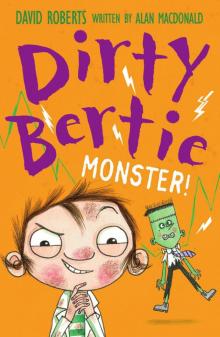 Monster!
Monster!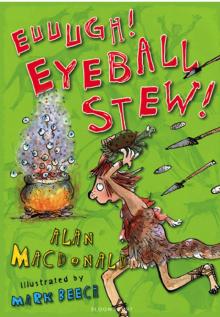 Euuuugh! Eyeball Stew!
Euuuugh! Eyeball Stew!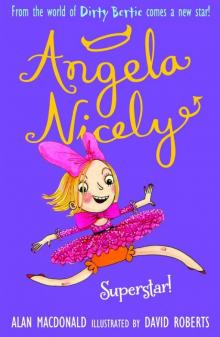 Superstar!
Superstar!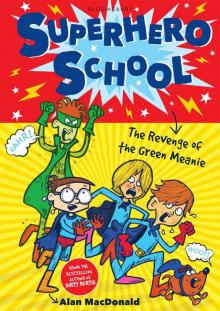 Superhero School
Superhero School Pong!
Pong!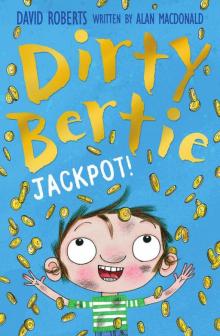 Jackpot!
Jackpot! Aliens!
Aliens!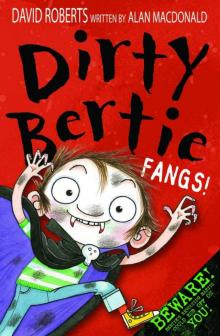 Fangs!
Fangs!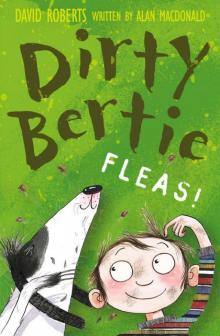 Fleas!
Fleas!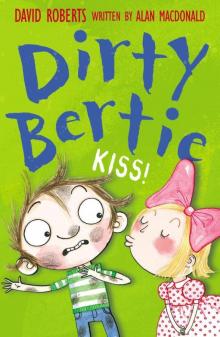 Kiss!
Kiss!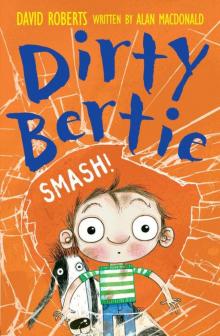 Smash!
Smash!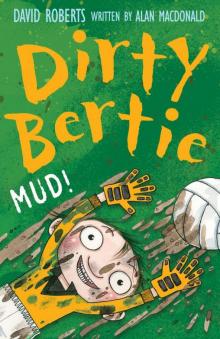 Mud!
Mud!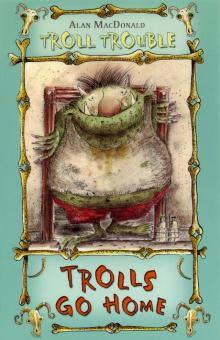 Trolls Go Home!
Trolls Go Home!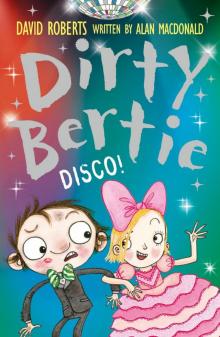 Disco!
Disco!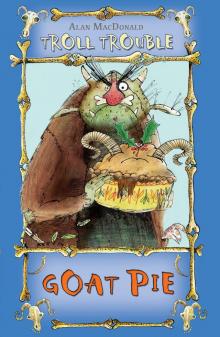 Goat Pie
Goat Pie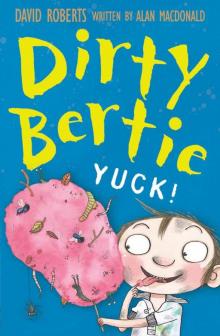 Yuck!
Yuck!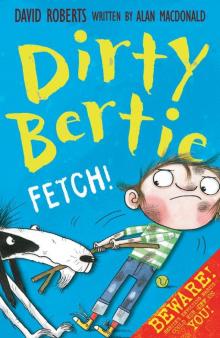 Fetch!
Fetch!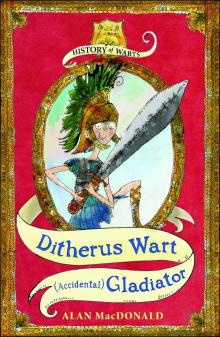 Ditherus Wart
Ditherus Wart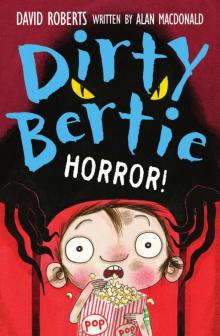 Horror!
Horror! Pirate!
Pirate!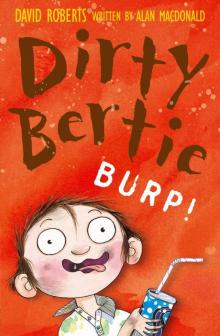 Burp!
Burp!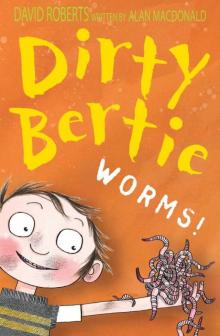 Worms!
Worms!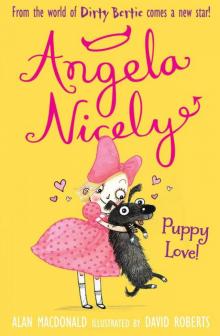 Puppy Love!
Puppy Love!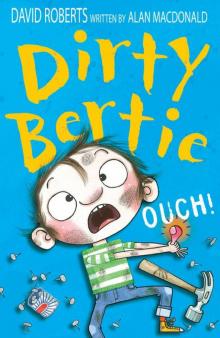 Ouch!
Ouch!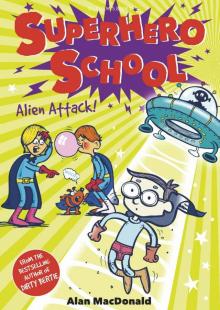 Alien Attack!
Alien Attack!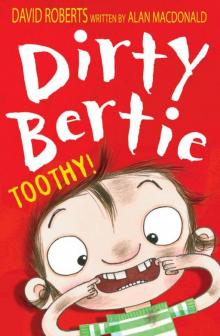 Toothy!
Toothy!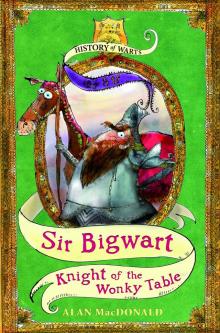 Sir Bigwart
Sir Bigwart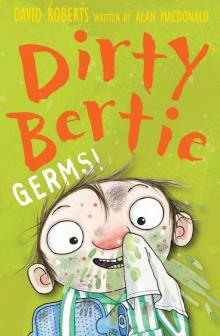 Germs!
Germs!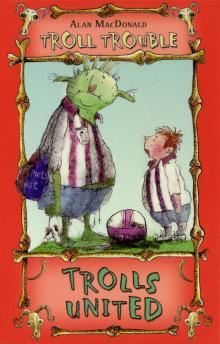 Trolls United
Trolls United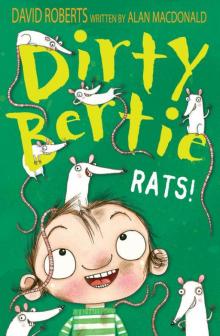 Rats!
Rats!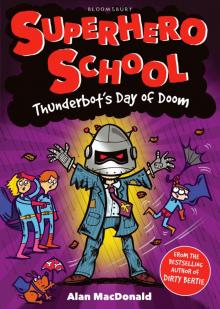 Thunderbot's Day of Doom
Thunderbot's Day of Doom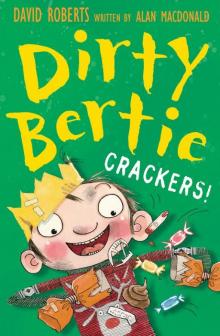 Crackers!
Crackers!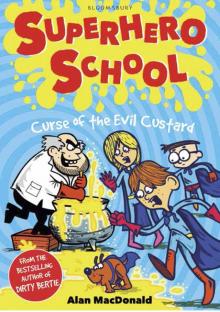 Curse of the Evil Custard
Curse of the Evil Custard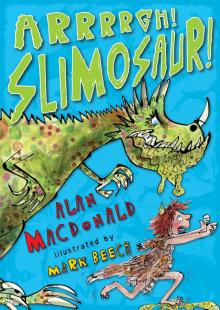 Arrrrgh! Slimosaur!
Arrrrgh! Slimosaur!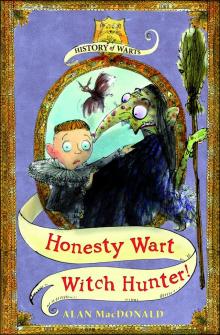 Honesty Wart
Honesty Wart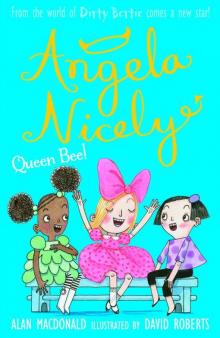 Queen Bee!
Queen Bee! Snow!
Snow!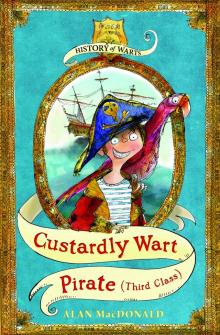 Custardly Wart
Custardly Wart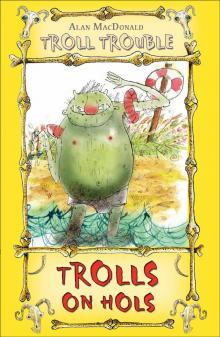 Trolls on Hols
Trolls on Hols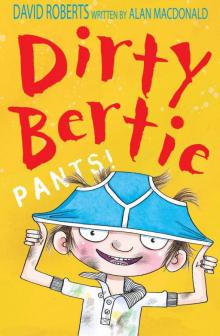 Pants!
Pants!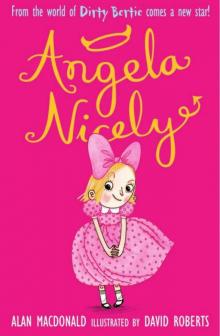 Angela Nicely
Angela Nicely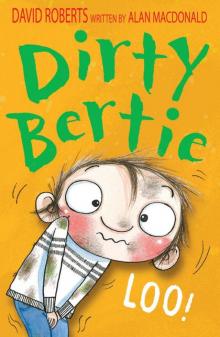 Loo!
Loo!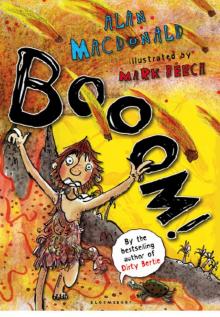 BOOOM!
BOOOM!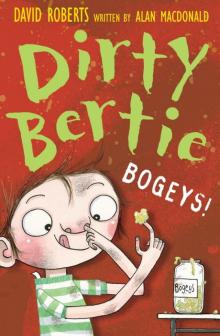 Bogeys!
Bogeys!